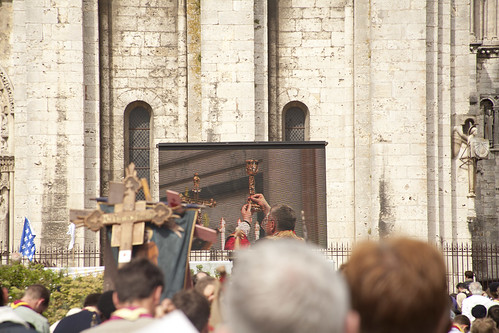 |
| Holy Communion at the LMS Oxford Pilgrimage, at the Oxford Blackfriars (Dominican Rite) |
This weekend I have had a letter (the same one) published in
The Catholic Herald, The Tablet, The Catholic Universe, and
The Catholic Times.
I am very grateful to the Editors of our UK Catholic national weeklies for publishing it, and in this way making it possible for the Latin Mass Society to get our view out to the widest possible public.
As well as publishing our own 'statement' online and through social media, we have written on related matters to all our priest supporters, and to the Bishop Chairman of the Bishops' Conference Committee on Worship (Bishop Alan Hopes of East Anglia), who is our regular liaison with the Conference.
The current situation is a reminder of the utility of an organisation such as the Latin Mass Society which has the recognition and standing, and the resources and contacts, to do something like this when the need arises.
Here it is. (It has been edited slightly in different ways in the different papers; this is the ur-text.)
-------------------
Sir,
In light of the news of the continuing Corona virus epidemic and measures responding to that from bishops around the country, I would like to note the following.
At celebrations of the Extraordinary Form (the Traditional Mass) it is not permitted to distribute the Host in the hand. Should the suspension of distribution on the tongue be necessary for the safety of the public, there would be no Communion of the Faithful at celebrations of the Extraordinary Form.
This is not a matter of legalism. The Extraordinary Form places great emphasis to the reverence due to the Blessed Sacrament in all its ceremonies and texts, and reception in the hand in this context would be not just incongruous but a cause of distress to the Faithful. The overwhelming majority of Catholics attached to the ancient Mass would rather make an Act of Spiritual Communion.
There seems, however, to be no objective medical foundation for the claim that reception in the hand is safer than reception on the tongue. The office of Archbishop Alexander Sample of Portland, Oregon, notes, following consultation with medical specialists, that in terms of the danger of passing on infection from one Communicant to another by the Minister inadvertently touching them in turn, ‘done properly the reception of Holy Communion on the tongue or in the hand pose a more or less equal risk.’
There is also the danger of each Communicant infecting his own Host from his own hands, which is entirely avoided by the method of receiving on the tongue.
Yours faithfully,
Joseph Shaw
Chairman, Latin Mass Society








